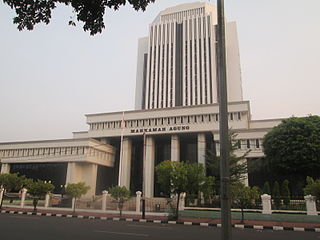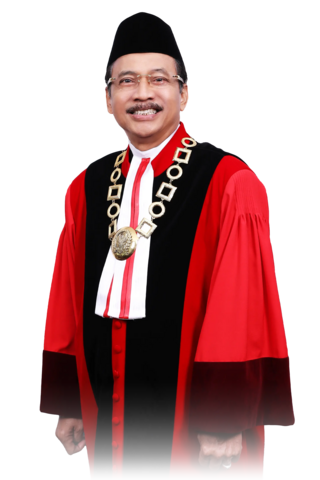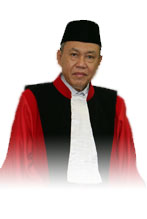
The Supreme Court of the Republic of Indonesia is the independent judicial arm of the state. It maintains a system of courts and sits above the other courts and is the final court of appeal. It can also re-examine cases if new evidence emerges.

The Judiciary of Indonesia constitutionally consists of the Supreme Court of Indonesia,the Constitutional Court of Indonesia,and the lesser court system under the Supreme Court. These lesser courts are categorically subdivided into the public courts,religious courts,state administrative courts,and military courts.
Sandile Ngcobo is a retired South African judge who was the Chief Justice of South Africa from October 2009 to August 2011. He served in the Constitutional Court of South Africa from August 1999 until his retirement in August 2011. Before that,he was a judge of the Cape Provincial Division and the Labour Appeal Court.

The Constitutional Court of the Republic of Indonesia is one of the apex courts in Indonesia along with the Indonesian Supreme Court. Its primary role is reviewing the constitutionality of Acts (undang-undang). It also has other functions,including resolving disputes over the powers of state institutions,settling disputes over the results of general elections,deciding on the dissolution of political parties,and supervising impeachment. The last two functions have never been exercised by the Court.

The Judicial Commission of Indonesia was established as a consequence of the third amendment to the Constitution of Indonesia ratified by the Indonesian People's Consultative Assembly on 9 November 2001. The Commission's duty is to monitor the performance of judges,advise the House of Representatives on judicial appointments and review community complaints about the behavior and fairness of presiding judges.

Mohammad Mahfud Mahmodin,commonly known as Mahfud MD,is an Indonesian politician,and legal academic who served as the 14th Coordinating Minister for Political,Legal,and Security Affairs of Indonesia from 2019 to 2024. He also previously served as the Chief Justice of the Constitutional Court of Indonesia,member of the People's Representative Council,Minister of Defense,and Minister of Law and Human Rights.

Patrialis Akbar is an advocate and politician who was member of the Constitutional Court Justice of the Indonesian Constitutional Court for the period 2013–2017 from Padang,West Sumatra. He has a complete career in three branches of state,legislative,executive and judicial power. He had served as a member of the House of Representatives for two periods.

Maria Farida Indrati is a former justice of the Constitutional Court of Indonesia for two terms. During her both terms,she was the only woman among the Court's nine members.
Sisi Virginia Khampepe is a retired South African judge who served in the Constitutional Court of South Africa between October 2009 and October 2021. Formerly a prominent labour lawyer,she joined the bench in December 2000 as a judge of the Transvaal Provincial Division. She was also a member of the Truth and Reconciliation Commission.

Russell S. Brown is a former puisne justice of the Supreme Court of Canada. He was nominated by Prime Minister Stephen Harper to replace outgoing justice Marshall Rothstein and served in the role starting on August 31,2015. Prior to his appointment to the Supreme Court,he was a justice at the Alberta Court of Appeal,and before that a law professor at the University of Alberta. He resigned on June 12,2023,prior to the completion of an investigation by the Canadian Judicial Council into alleged harassment.

The chief justice of the Constitutional Court of Indonesia is the head of the Constitutional Court of Indonesia.

Arief Hidayat was the fifth Chief Justice of the Constitutional Court of Indonesia. Previously,he was a professor of law at his alma mater,Diponegoro University.

Anwar Usman is an Indonesian judge and jurist who was the sixth Chief Justice of the Constitutional Court of Indonesia. He was elected to the position on 2 April 2018,replacing Arief Hidayat. He previously served as the fifth Deputy Chief Justice of the Constitutional Court of Indonesia. Usman served on the Constitutional Court for four years prior to his confirmation as Deputy Chief Justice. Before replacing Arsyad Sanusi as a sitting justice on the court in April 2011,Usman was a high court judge in Jakarta as well as the manager of human resources at the Supreme Court of Indonesia.

Wahiduddin Adams is a former justice of the Constitutional Court of Indonesia. He and Aswanto were appointed to the court by the People's Representative Council in March 2014. Prior to serving on the bench,Adams was the Director General of Legislation at the Ministry of Law and Human Rights.
Ahmad Fadlil Sumadi is a former judge on the Constitutional Court of Indonesia. Sumadi initially served as the registrar of the Constitutional Court between 2003 and 2008,then served as the deputy chief justice of the High Court of Yogyakarta before the Supreme Court of Indonesia appointed him to the Constitutional Court in 2010.

Suhartoyo is currently the Chief Justice of the Constitutional Court of Indonesia,a position that he has held since November 2023. He ascended to the leadership of the Court following the demotion of Anwar Usman after the Court's Honorary Council found that he had committed ethical violations,which cleared the way for President Joko Widodo’s eldest son to run for vice president in 2024.

I Dewa Gede Palguna is a constitutional law academic who served two terms as a justice of the Constitutional Court of Indonesia. He holds the record for having been the youngest ever justice of the Indonesian Constitutional Court. In February 2020,he was appointed to the ethics council of Indonesia's Child Protection Commission.

The province of Aceh in Indonesia enforces some provisions of Islamic criminal law,the sole Indonesian province to do so. In Aceh,Islamic criminal law is called jinayat. The laws that implement it are called Qanun Jinayat or Hukum Jinayat,roughly meaning "Islamic criminal code". Although the largely-secular laws of Indonesia apply in Aceh,the provincial government passed additional regulations,some derived from Islamic criminal law,after Indonesia authorized the province to enact regional regulations and granted Aceh special autonomy to implement Islamic law. Offences under the provisions include alcohol consumption,production and distribution,gambling,adultery,rape,sexual harassment,certain intimacies outside marriage,and certain homosexual acts. Punishments include caning,fines,and imprisonment. There is no provision for stoning;an attempt to introduce it in 2009 was vetoed by Governor Irwandi Yusuf. In 2016 Aceh processed 324 first instance court cases under Islamic criminal law,and carried out at least 100 caning sentences.

A series of mass protests led by students took place at major cities in Indonesia from 23 September 2019,to rally against new legislation that reduces the authority of the Corruption Eradication Commission (KPK),as well as several bills including a new criminal code that penalises extramarital sex and defamation against the president. The protesters consisted of mostly students from over 300 universities,with no association with any particular political parties or groups. The protests were the most prominent student movement in Indonesia since the 1998 riots that brought down the Suharto regime.
Human rights in Hungary are governed by the Constitution of Hungary,laws passed by the National Assembly,and oversight of international organizations such as the Council of Europe. Human rights groups such as Amnesty International and Human Rights Watch have raised concern for the status of human rights in Hungary under the rule of Viktor Orbán and the Fidesz party since 2010.














